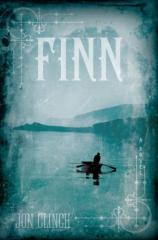Reading Group Guide
Discussion Questions
Finn

1. Finn (the character) is both sympathetic and unsympathetic. How do his various traits and actions make him that way? Did you ?nd yourself rooting for him or against him? For what reasons? How did your reactions to him change as the book went on?
2. Finn is deeply con?icted on issues of race. Which of his impulses are good? Which are bad? What could he have done to change the outcome of his circumstances?
3. Finn is also ?ercely con?icted in his relationship with his father, the Judge. He wants desperately to please him, but subverts his own intentions time and again. How does this make you feel about the two of them–and about their relationship?
4. The author chose to give Finn no ?rst name and to give certain other characters either no names at all or names that identify them as archetypes (e.g., the Judge, the preacher, the laundress). Why do you suppose he made this decision? How did this unusual naming convention affect your understanding of and involvement with the story?
5. The events in Finn are told out of sequence. How would the novel have been different if it had been told chronologically?
6. Although the action in Finn is closely tied to the events of Adventures of Huckleberry Finn and The Adventures of Tom Sawyer, the novel stands by itself and takes some very different directions from Twain’s work. Did that surprise you? If the author had chosen to stay closer to Twain, how would the book have been different?
7. If you have read Adventures of Huckleberry Finn recently, how did the world envisioned in Twain’s novel compare with the world in Clinch’s? Which seemed to you more realistic? Why?
8. Adventures of Huckleberry Finn has a ?rst-person narrator (Huck tells the story himself ), while Finn has an omniscient third-person narrator. Huck is told in the past tense, and Finn in the present. How do these differences affect your understanding of the novels and your connection to them?
9. Adventures of Huckleberry Finn is widely regarded as a masterpiece of dialect writing. Did the author of Finn choose wisely in avoiding the use of dialect in his novel? What tricks did he use to give the impression of dialect speech without actually rendering it?
10. What images–either from memorable scenes or through vivid language–stand out to you? The author has said that much of the inspiration for the language of this book came from William Faulkner, the King James Bible, and old gospel hymns. Does that make sense to you?
11. Some minor characters from Adventures of Huckleberry Finn reappear in Finn. Which of them did you recognize? How are they different, if at all?
12. One important theme of Finn is paternity: the things we take from our fathers and pass to our children. There are several father-and-child combinations in the book, both real and symbolic: Finn and the Judge, Finn and Huck, Judge Thatcher and Huck, Judge Thatcher and Becky, the Judge and Will, Judge Stone and his children, Mary’s father and Mary, the laundress’s husband and the murdered child. How do they compare to one another?
13. The last sentence of Finn–“He will take what he requires and light out”–echoes the end of Adventures of Huckleberry Finn: “...I got to light out for the Territory ahead of the rest. . . . ” Yet it also refers to the issues of paternity raised in Finn. Twain’s ending was hopeful. Is Clinch’s? How are the endings different?
Finn
- Publication Date: February 20, 2007
- Genres: Fiction
- Hardcover: 304 pages
- Publisher: Random House
- ISBN-10: 1400065917
- ISBN-13: 9781400065912








